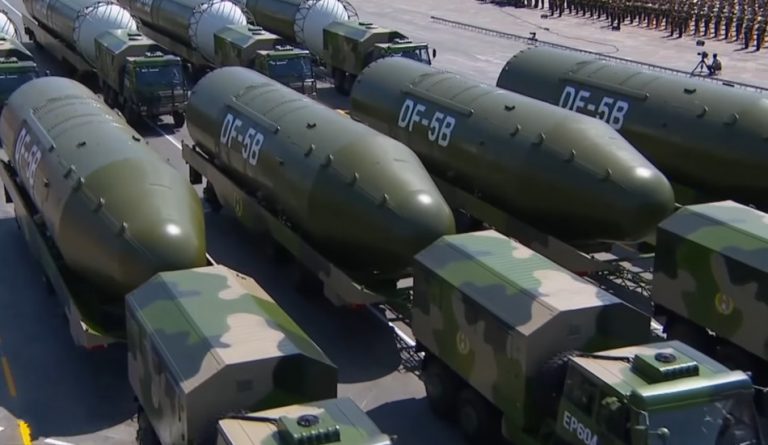China’s senior arms official announced today that the country will continue to upgrade and expand its nuclear weaponry and urged Moscow and Washington to take initiative in reducing their larger stockpiles first.
Fu Cong, director-general of the arms control department at the Chinese Foreign Ministry, said that “China will continue to modernize its nuclear arsenal for reliability and safety issues,” and added that since the U.S. and Russia currently have the largest number of nuclear weapons, they should be first in making the cuts.
According to data from the Stockholm International Peace Research Institute (Sipri), the U.S. had 5,550 nuclear warheads as of January 2021, compared to China’s 350.
READ MORE:
China Could Possess 1,000 Nuclear Warheads by 2030: Pentagon
China Found Building Third Missile Silo Field, Indicating ‘Explosive’ Nuclear Expansion
‘A nuclear war cannot be won’
On Jan. 3, a pledge was made by the world’s five leading nuclear powers to only use atomic weapons in a defensive capacity. The five countries — the U.S., China, Russia, the UK and France — declared that “a nuclear war cannot be won and must never be fought,” further promising to strengthen measures in order to “prevent the unauthorized or unintended use of nuclear weapons across the world.”
“As nuclear use would have far-reaching consequences, we also affirm that nuclear weapons – for as long as they continue to exist – should serve defensive purposes, deter aggression and prevent war,” the group said. “We strongly believe that the further spread of such weapons must be prevented.”
Success
You are now signed up for our newsletter
Success
Check your email to complete sign up
Washington has regularly accused Beijing of rapidly building up its nuclear arsenal, but Fu said the claims were “untrue,” adding that “China has always adopted a no-first-use policy for nuclear weapons and maintains nuclear capabilities at the minimum level required for national security.”
According to the U.S. government, China is currently set to expand its nuclear arsenal with as many as 700 warheads by 2027, and possibly 1,000 by 2030.
China has previously rejected Washington’s invitations to join US-Russian talks on reducing the number of nuclear weaponry, pointing out that its arsenal is much smaller.
However, Fu told reporters that Beijing would be happy to join talks on arms controls once the U.S. had reduced its nuclear stockpile “to our level.”
“The US and Russia still possess 90 percent of the world’s nuclear warheads. They must reduce their nuclear arsenal in an irreversible and legally binding way,” Fu added.
‘Denuclearization a priority for the world’
Concerns over the risks of a nuclear conflict between China and the U.S. have been highlighted by recent tensions between NATO and Russia over Ukraine. Ties between Beijing and Washington have also been significantly strained over a series of issues, including China’s intentions to reunite independently governed Taiwan – by force if necessary.
READ MORE:
70-Plus Nuclear Fuel Rods at China’s Largest Reactor Taishan Damaged by Possible Design Flaws: Whistleblower
Ukraine and Russia Are on the Verge of War, With Possible Global Consequences
Zhao Tong, a senior researcher at the Carnegie-Tsinghua Centre for Global Policy in Beijing, said he did not expect a shift in nuclear policy, adding that the global conference was a formality to ease tensions rather than enacting real change.
“Although the statement talked about the ultimate goal of a world without nuclear weapons, in reality all these countries are still in keen strategic competition,” Zhao said. “The process of denuclearization has not only not happened, it has developed the other way around. This means that there is a discrepancy in this joint statement and countries’ actual practices.”
Zhao also mentioned that the U.N. does not formally recognize other countries that possess nuclear weapons as nuclear states, citing North Korea, India, Pakistan and Israel. “There is little that can be done to call for arms reduction even though denuclearization should be a priority for the world.”














